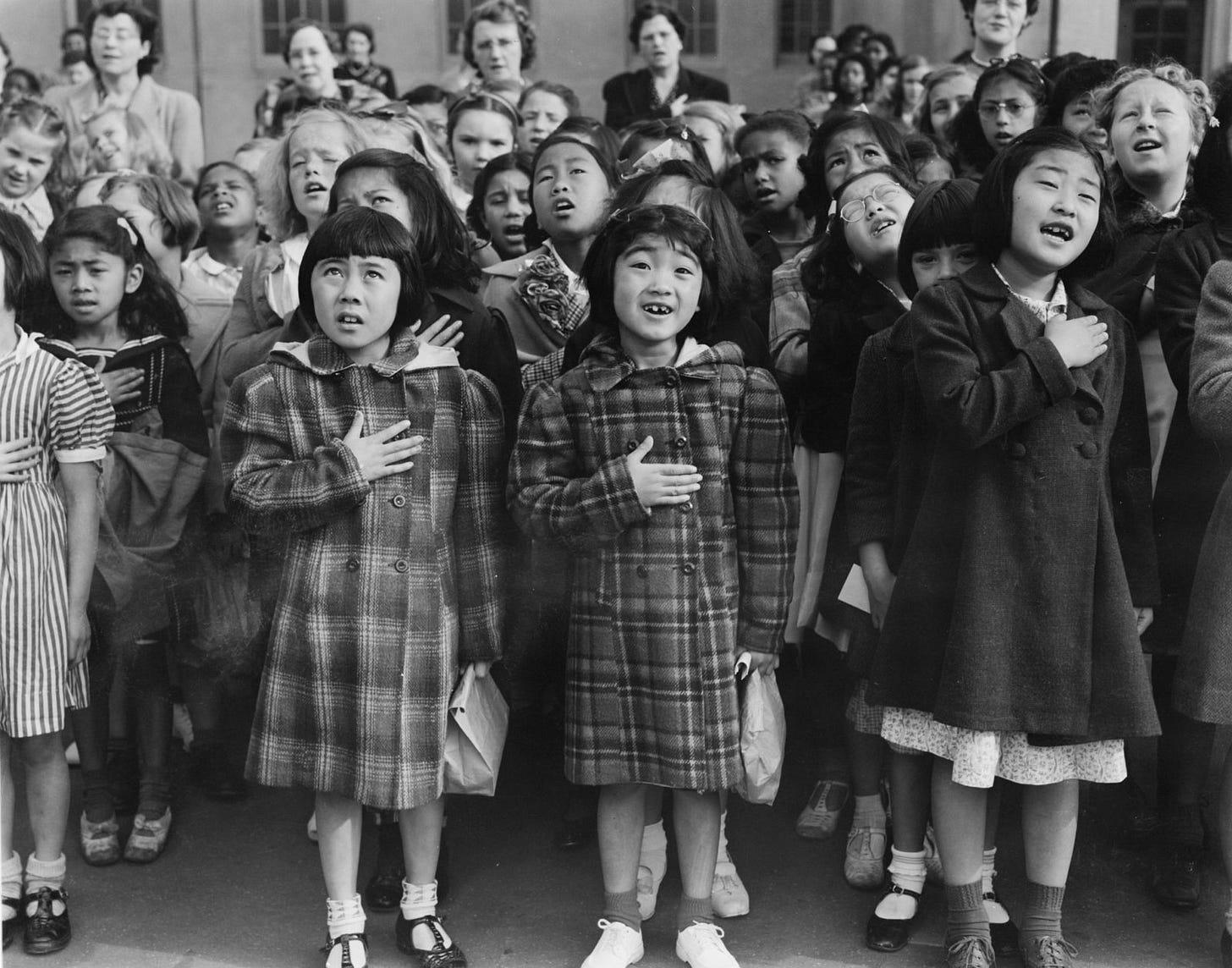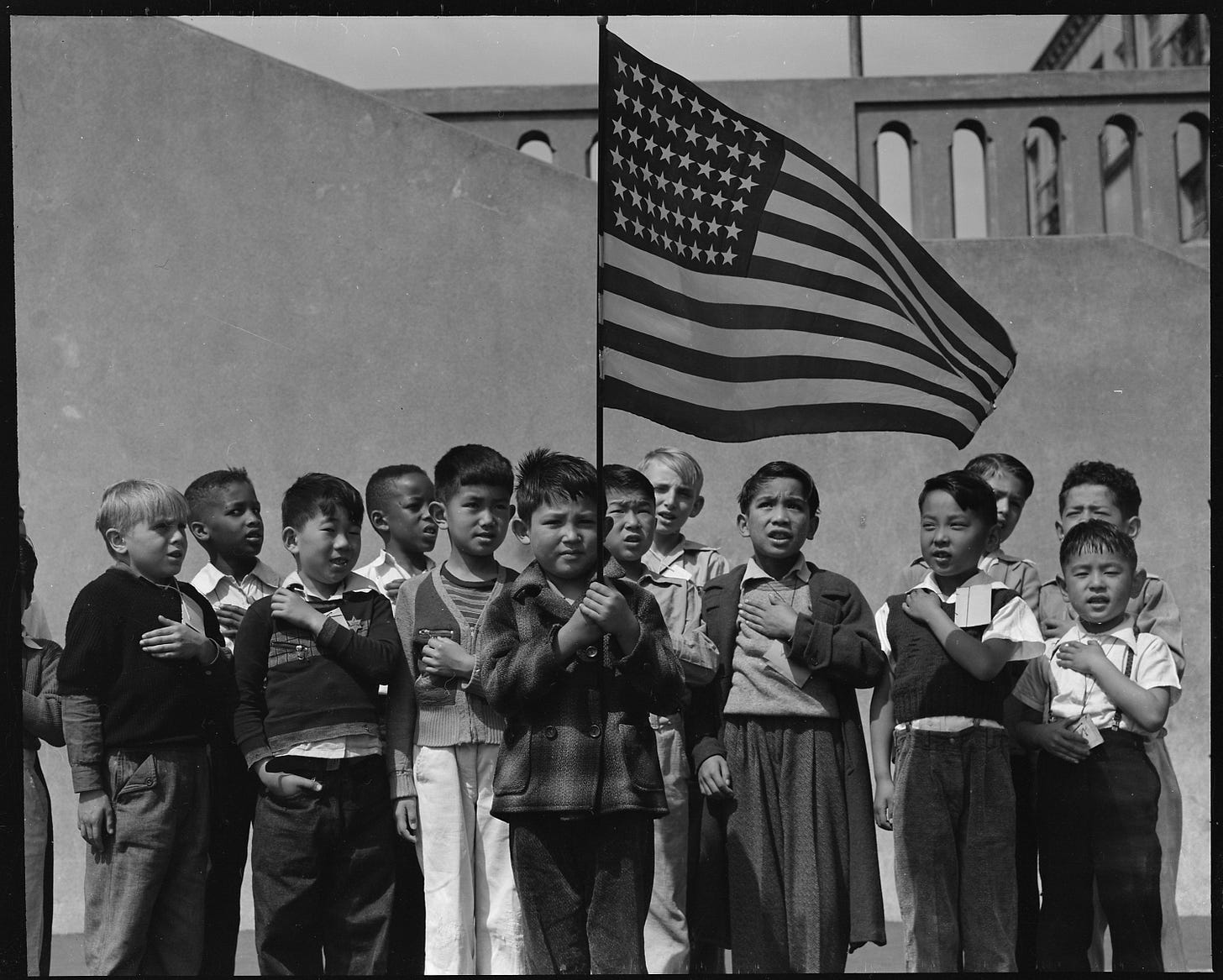Can We Replace the Pledge of Allegiance with the Opening Lines of The Godfather Already?
I have a confession to make...
…about halfway into my career I stopped teaching the Pledge of Allegiance.
I know, I know.
I realize I’m headed straight for American Hell which I imagine to be a Walmart with no air conditioning or exits. I should probably be tried for treason. Afterall, my infraction ranks right up there with those January 6th walking tours of the Capitol and Fergie’s 2018 jazzy rendition of the Star-Spangled Banner.
But at some point, somewhere between my bullshit detector going haywire and the five-year-olds in my class spitting out, “For witches stand, under God, one nation, invisible, for justice and all,” I realized no part of this ritualized inculcation was making any sense to anyone. It was literally nonsense in both action and words.
The forced nature of our classroom’s flag-worship often made me think of photographer Dorothea Lange’s famous 1942 photo titled Pledge of Allegiance, Rafael Weill Elementary School. The photograph features Japanese-American school children placing their hands over their hearts in recitation of a loyalty oath to a country that was, AT THAT VERY MOMENT, rounding them and their families up into internment camps.
I decided I no longer needed to help foster such blind nationalistic loyalty from such small children. The students could offer their allegiance later, of their own volition, when they reached an age of consent but not now when they still believed in the Tooth Fairy and Santa Claus and could barely tie their own shoes.
Using my professional judgement, I determined our class’s collective energy could be better spent learning how to read the calendar or singing a song about a rainbow or counting backwards by tens instead of engaging in a short but jingoistic indoctrination ceremony.
Someone who believes that the point of public education is to raise up the next generation of American citizenry probably would strongly disagree with my decision. And I respect that. I don’t necessarily begrudge them their point of view. I’ve witnessed numerous patriotic teachers teach their students about Old Glory and Betsy Ross and Uncle Sam and how to handle a flag like it’s God’s Kleenex (ironically, it’s the immigrant educators who seem to be the most enthusiastically nationalistic). I don’t begrudge the other teachers’ patriotic pedagogy despite the fact to me it’s all red, white, and blue-shit.
However, there’s a caveat!
I must also admit that whenever a rousing rendition of You’re a Grand Old Flag goes off in my vicinity all of a sudden I become very gay for the U.S.A. That song is such a toe-tapping bop that I just can’t help but sing along with muted fervor! I may not be a Pledge peddler, but I am definitely a sucker for patriotic songs (America the Beautiful, Mine Eyes Have Seen the Glory, the national anthem). Those tunes are like Christmas carols for the country, and I love Christmas carols. In fact, I believe Mariah Carey should meet the moment and make a patriotic version of her monster holiday hit calling it All I Want for Christmas is My Reproductive Rights.
The larger point here, however, is that thankfully no one ever really noticed my petty, little rebellion. We don’t yet live in a completely competent police state where authorities surveil our flag-worship activities or take urine samples to measure our levels of our patriotism hormones.
I purposefully never announced my resistance to anyone and kept my shenanigans to myself, but other teachers seemed to be more courageous about letting people in on their own personal pedagogical preferences.
Most of the time it was the holy rollers who seemed to have no qualms about lodging their disagreements with curricula.
A first-grade teacher I know once admitted out loud in a science-themed professional development, irrespective of nothing and with a completely straight face, “Well, you all know, evolution is not a proven fact.”
All us teachers looked at her blankly as we silently thought our thoughts and held our forked tongues. Refuting her assertion wasn’t worth any tussle. We were all there in the workshop to learn how to teach the life cycle of butterflies and trees not re-litigate the Scopes’ Monkey Trial.
I suppose Ms. Creationism was attempting to play a clever game of semantics—after all she pointed out to us that it was called the Theory of Evolution not the Law of Evolution. But some simple research into scientific language would have revealed that scientific “theories” are explanations while “laws” are descriptions of natural phenomena. Laws don’t attempt to explain why something happened whereas theories do. Using either word doesn’t mean one concept is less true than the other. The anti-evolution teacher was misunderstanding scientific language probably hoping that she was a first-grade teacher in Los Angeles had just happen to find the secret logistical flaw in all of science and because of this our elementary school could just go ahead and replace all our science curricula with children’s Bibles
But a big part of the reason nobody pushed back against her was that we all respected this teacher. She was actually a wonderful educator…of elementary school language and math.
Maybe her suspicions of evolution would have been more problematic for us if she was a high school biology teacher. But she wasn’t. She was a skilled educator of elementary kids in basic English and math. I respected that regardless of her holy-roller skepticism on evolution and her rumored before-school prayer circles held in her classroom with a select clique of devout colleagues.
Many times in my career I have worked with fellow teachers whom I considered to be religious nut jobs or odd birds for one reason or another.
I once seriously asked a Pentecostal colleague during a lunchtime discussion of heaven and hell if she believed that if we dug a hole into the Earth below us, we would eventually stumble upon Satan chillin’ in his fiery living room.
She answered, “Yes!”
I was shooketh.
The principal, who was at the table lunching with us, nearly spit out his food at her quick and fervent response. We were silenced and astounded by her belief in an actual red dude with horns and a pointy fork living underneath us. Have you no common sense, woman? I wondered. How do you discuss the solar system or earthquakes with your students while at the same time believing there are angels just past Jupiter and a devil’s lair beneath our feet? I mean, did she think volcanoes were chimneys? It didn’t seem possible that she could hold a bachelor’s degree and a teaching credential and still think these things.
But I wasn’t her supervisor; I was her colleague. I had no real say in measuring her qualifications to deliver the mandated curriculum or state standards. That was the principal’s job, and he was busy spitting up his food.
But, then again, honestly, she too was a decent and proficient elementary school teacher. Her competency in English language development was as doubtless as her love for her young charges. So what if she believed in the existence of Satan? I myself am extra careful during Mercury retrograde and once had my chakras realigned, couldn’t those be examples of a similar types of superstition?
Essentially, what else are we teachers supposed to do in a country where everyone is entitled to believe what they believe, whether those beliefs be in a flat earth, homosexuality as a mortal sin, the existence of the gender spectrum, vaccines as poison, Western Civilization as superior, and raisins belonging in potato salad? We have to be as accepting and tolerant of some level of foolishness in each other otherwise we become Northern Ireland, the Levant, or Vanderpump Rules.
Sometimes I talk with my colleagues and the idiocy they casually reveal about themselves in conversation astounds me, to the point I slowly stopped visiting the faculty lounge in order to protect whatever modicum of professional respect I had for them (and vice versa, I’m sure).
We live in an extremely diverse, pluralistic, and polyglot society with atheist and evangelicals, commies and capitalists, Dodger fans and Padre fans, all of whom are also schoolteachers.
Agreeing on the purpose of something as expansive and encompassing as American public education is probably, ultimately, impossible. No two people or two groups are going to agree on what teaching or learning is exactly. Once public policy is set and the government’s wheels of bureaucracy start slowly a-spinning, implementing the supposed consensus reached by “the public,” it doesn’t mean that people have actually agreed on much of anything.
I personally don’t believe in a place called Hell or an old man in white beard in a cloud throne, but I do believe in America. I believe in the ideal of a multicultural democratic republic with equal rights for all. I also believe such a utopia begins in elementary schools.
Maybe a more realistic and appropriate pledge, if one be necessary at all, would be a truncated version of Amerigo Bonasera’s opening lines in The Godfather.
The funeral parlor owner goes to the mafia boss, Don Corleone, on the day of the don’s daughter’s wedding when the mafioso traditionally cannot refuse a request. Bonasera says that the American justice system has failed him after the two men who brutalized his daughter get off with a suspended sentence. The opening scene begins with him intoning, “I believe in America. America has made my fortune” and then ending his speech with “but for justice we go to Don Corleone.”
Maybe that’s what my kindergarteners should recite every day. They should recite Amerigo Bonasera’s speech while holding their right hands over their hearts,
It would be closer to speaking something of the truth about this nation than what we have now.
Or, we could simply wait for our country to evolve.
But only for those of us who believe in such a thing as evolution.





